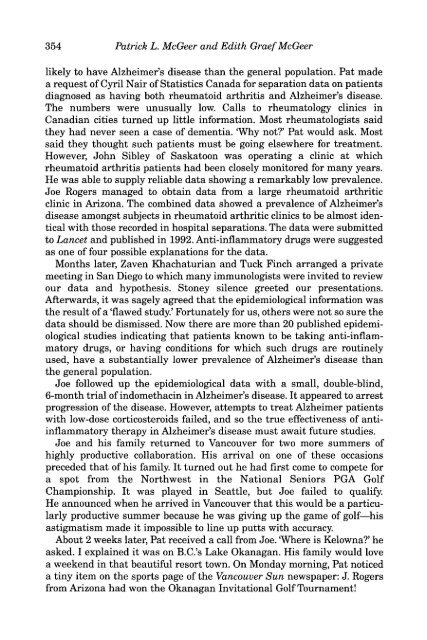Edith Graef McGeer - Society for Neuroscience
Edith Graef McGeer - Society for Neuroscience
Edith Graef McGeer - Society for Neuroscience
You also want an ePaper? Increase the reach of your titles
YUMPU automatically turns print PDFs into web optimized ePapers that Google loves.
354 Patrick L. <strong>McGeer</strong> and <strong>Edith</strong> <strong>Graef</strong><strong>McGeer</strong><br />
likely to have Alzheimer's disease than the general population. Pat made<br />
a request of Cyril Nair of Statistics Canada <strong>for</strong> separation data on patients<br />
diagnosed as having both rheumatoid arthritis and Alzheimer's disease.<br />
The numbers were unusually low. Calls to rheumatology clinics in<br />
Canadian cities turned up little in<strong>for</strong>mation. Most rheumatologists said<br />
they had never seen a case of dementia. 'Why not?' Pat would ask. Most<br />
said they thought such patients must be going elsewhere <strong>for</strong> treatment.<br />
However, John Sibley of Saskatoon was operating a clinic at which<br />
rheumatoid arthritis patients had been closely monitored <strong>for</strong> many years.<br />
He was able to supply reliable data showing a remarkably low prevalence.<br />
Joe Rogers managed to obtain data from a large rheumatoid arthritic<br />
clinic in Arizona. The combined data showed a prevalence of Alzheimer's<br />
disease amongst subjects in rheumatoid arthritic clinics to be almost identical<br />
with those recorded in hospital separations. The data were submitted<br />
to Lancet and published in 1992. Anti-inflammatory drugs were suggested<br />
as one of four possible explanations <strong>for</strong> the data.<br />
Months later, Zaven Khachaturian and Tuck Finch arranged a private<br />
meeting in San Diego to which many immunologists were invited to review<br />
our data and hypothesis. Stoney silence greeted our presentations.<br />
Afterwards, it was sagely agreed that the epidemiological in<strong>for</strong>mation was<br />
the result of a 'flawed study' Fortunately <strong>for</strong> us, others were not so sure the<br />
data should be dismissed. Now there are more than 20 published epidemiological<br />
studies indicating that patients known to be taking anti-inflammatory<br />
drugs, or having conditions <strong>for</strong> which such drugs are routinely<br />
used, have a substantially lower prevalence of Alzheimer's disease than<br />
the general population.<br />
Joe followed up the epidemiological data with a small, double-blind,<br />
6-month trial of indomethacin in Alzheimer's disease. It appeared to arrest<br />
progression of the disease. However, attempts to treat Alzheimer patients<br />
with low-dose corticosteroids failed, and so the true effectiveness of antiinflammatory<br />
therapy in Alzheimer's disease must await future studies.<br />
Joe and his family returned to Vancouver <strong>for</strong> two more summers of<br />
highly productive collaboration. His arrival on one of these occasions<br />
preceded that of his family. It turned out he had first come to compete <strong>for</strong><br />
a spot from the Northwest in the National Seniors PGA Golf<br />
Championship. It was played in Seattle, but Joe failed to qualify.<br />
He announced when he arrived in Vancouver that this would be a particularly<br />
productive summer because he was giving up the game of golf—his<br />
astigmatism made it impossible to line up putts with accuracy.<br />
About 2 weeks later, Pat received a call from Joe. 'Where is Kelowna?' he<br />
asked. I explained it was on B.C.'s Lake Okanagan. His family would love<br />
a weekend in that beautiful resort town. On Monday morning, Pat noticed<br />
a tiny item on the sports page of the Vancouver Sun newspaper: J. Rogers<br />
from Arizona had won the Okanagan Invitational Golf Tournament!











![[Authors]. [Abstract Title]. - Society for Neuroscience](https://img.yumpu.com/8550710/1/190x245/authors-abstract-title-society-for-neuroscience.jpg?quality=85)





